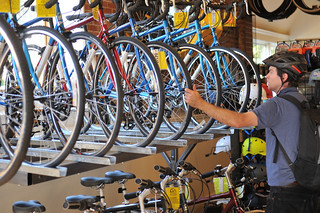Today’s Portland City Club report that gave a big bear hug to biking also said buyers of new bikes should pay a special tax: 4 percent on each new bike purchase in Oregon, or $20 for a $500 bike.
The report recommended that the money — it’d be about $840,000 annually for the State of Oregon — go to programs that support and educate road users about bikes.
The city’s bicycle advocates aren’t exactly thrilled. But perhaps surprisingly, they aren’t gasping in horror, either.
“Generally speaking, the BTA is opposed to any new barrier between people and biking,” Bicycle Transportation Alliance advocacy director Gerik Kransky said today. “That being said, we’re open to the conversation. … It looks like their ideas about how to spend the money are pointed in the right direction.”
As close watchers of the local bike scene know, this nuance about a dedicated bike tax is nothing new. Back in 2010, we shared that bike-loving U.S. Rep. Earl Bluemenauer and Portland Bike Coordinator Roger Geller were both open to the concept, as was the BTA. Two years before that, we took a look at the Colorado Springs bike tax, which charges $4 for each adult-size bike and is quite popular in that bike-friendly city.
“$20 on a $500 bike is really not asking a lot to fund programs, like Safe Routes to School, that we feel are important.”
— Henry Leineweber, lead writer of City Club report
I asked Henry Leineweber, lead writer for the City Club’s thoughtful report, why the committee settled on recommending an excise tax.
“It was in our charge as a committee to look at and make funding recommendations,” said Leineweber, whose day job is covering the recycling industry as a journalist. “It would be irresponsible of us to say, ‘All these things are great, and someone else should pay for it.'”
Bike infrastructure, of course, saves taxpayers lots of money by reducing the need to expand auto infrastructure. But the $830,000 or so raised by this tax wouldn’t be enough to pay for much infrastructure anyway.
Instead, the City Club committee recommended that it go to bike education programs which currently depend on Congressional support.
“$20 on a $500 bike is really not asking a lot to fund programs, like Safe Routes to School, that we feel are important and need a dedicated source of funding that are not subject to political whims at the national level,” Leineweber said.
Kransky, the BTA’s advocate, said that his organization (which is partly funded by Safe Routes to School) might again endorse such a tax as long as it were part of a general conversation about smarter transportation funding — the sort that might charge everyone for the road, but would charge more for trips that cause either congestion or road damage.
“If you’re talking about raising money through a bike excise tax, then let’s have a full conversation about what a new transportation utility model would look like,” Kransky said. “What about a street maintenance fee? There’s lots of ideas out there.”
Phillip Ross, founder of Portland-based cargo bike builder Metrofiets, said Wednesday that although in general he’s happy to pay taxes, he worries that an Oregon tax on bikes would drive more people to order their bikes online from manufacturers abroad.
“There are so many hurdles in being cost-competitive in a market that is dominated by foreign manufacturers coming in,” Ross said. “At the end of the day, it’s still way cheaper to just get your bikes from China. … It’s not hurting our business that much, because we’re still able to be cost-competitive, albeit on the higher end, [but] people are price-conscious enough that that sort of thing can make a difference.”

Fairbank said a bike excise tax for education
would have both ups and downs.
Jesse Fairbank, floor manager at River City Bicycles, said he’d have mixed feelings about the proposal.
“Most of our customers who walk through the door, very very few of them are relying solely on a bicycle,” he said. “They’re paying money through other avenues. … Yet another tax on road users who aren’t putting wear and tear on the system is kind of a tough pill to swallow.”
But he said River City Bicycles, which is Portland’s largest single retail shop, strongly supports education and advocacy, too:
“If cycling can be improved in terms of the safety of it, if there’s better education, if people are more aware of other road users, if there’s more people out doing it — that’s more people coming in buying bikes.”

